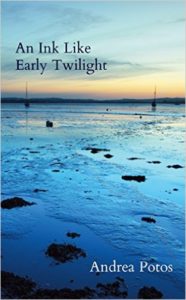 Review by B.A. Goodjohn
Review by B.A. Goodjohn
…Would you ever / like to glide through passageways / and aisles of night / tossing the hours behind you like confetti / or blossoms, / while below you / the sea sprawls—a voluminous train rippling / with fathoms and light?… (“When Asked Why Do I Always Leave the Country When I Travel” 13)
Of course, the answer has to be yes. Whether we translate “aisles of night” as the stark confines of transatlantic air travel, paid for with hours—lost or gained—or as a more metaphorical take on our daily movement through time and terrestrial space (kitchen tables and hospital wings, unknown streets, the grassed miles of England’s Hampstead Heath…), the “voluminous train rippling with fathoms and light” Potos hands us is hard to resist. So yes, please! YES, PLEASE!
AN INK LIKE EARLY TWILIGHT manages to braid three seemingly disparate threads: the narrator’s love of Keats, Mediterranean travel, and family. The result is a tightly plaited collection in which each poem’s thread emerges and then dives back down as another winds up to take its place.
The Keats’ thread requires a trip or vacation involving one of those transatlantic journeys to Britain, primarily to London where we first encounter Potos’ regard for Keats in “Old Village Walk” (14). Impatient with the tour guide’s apologies for the British weather, she yearns to ditch the handbook and instead walk to where “Hazlitt, Byron and large Liberal thinkers / flocked” and to where “the great Shelley, sailed his paper boats” (14). But Potos isn’t some star-struck anglophile in search of poet souvenirs and postcards. Far from it. She is in search of authentic encounters: she stuffs herself (“fingers dyed crimson”) with mulberries from Keats’ very own “ancient / perfect tree” (16), before tramping back to 1819 and to a lane near Highgate Village so she might eavesdrop on Coleridge and Keats sharing “their great caches of loss” (32). Wherever she travels, she’s on the hunt for some shared moment or reflection she might snare with a line or stanza to hang upon her page.
In the tradition of the Grand Tour, Potos doesn’t restrict her travels to the United Kingdom. She heads out to Italy and to the Greece of her grandparents to where she says, “something in me / feels even //with the earth, the weight of sun” (28). She is generous with her family: their lives, their thoughts and their challenges weave through many of these poems. Whether Potos is sensing the long familial reach backwards (“I climb the steep path, / my grandmother’s grandmother’s hands / softly pressed on my back” 28) or is reacting to today’s more immediate encounters (“I can’t explain how the hair / returning to my father’s scalp / is like a sky filling with silver lightning” 54), her writing is loving and reverential (though never cloying).
I particularly like the spare way she handles a grand meeting of all her loves in “Book Well”:
I watched
my daughter
approach,
peer,
then fall
into the deep-
delved earth
Keats spoke of,
the waters taught
by thirst
Emily wrote,
not for
one second
did I try
to save
her. (42)
AN INK LIKE EARLY TWILIGHT is a great example of how poetry springs from life and of how a collection of poems that race across time, space, and subject can come together into a tight and cohesive braid. The arrangement of poems feels effortless…this poem, then this poem, then this one…and the result for the reader is smooth and even. But for those of us who have struggled to braid hair, we know too well the extraordinary level of skill that such an arrangement demands of the braider.
Bravo, Potos.
AN INK LIKE EARLY TWILIGHT
by Andrea Potos
Salmon Poetry / Dufour Editions 2015
62 pp
B.A. Goodjohn is the author of two novels: STICKLEBACKS AND SNOW GLOBES (Permanent Press: NY) and THE BEGINNING THINGS (Underground Voices: CA). Her poetry collection, BONE SONG (Briery Creek Press: VA) was the winner of the 2014 Liam Rector Prize in Poetry and launched in June 2015. www.bagoodjohn.com
